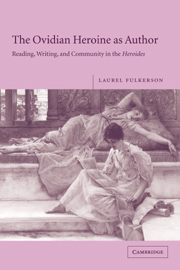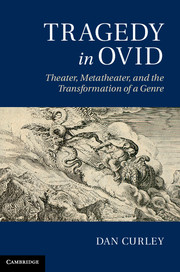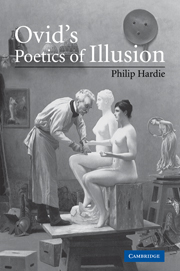The Ovidian Heroine as Author
Ovid's Heroides, a catalogue of letters by women who have been deserted, has too frequently been examined as merely a lament. In a new departure, this book portrays the women of the Heroides as a community of authors. Combining close readings of the texts and their mythological backgrounds with critical methods, the book argues that the points of similarity between the different letters of the Heroides, so often derided by modern critics, represent a brilliant exploitation of intratextuality, in which the Ovidian heroine self-consciously fashions herself as an alluding author influenced by what she has read within the Heroides. Far from being naive and impotent victims, therefore, the heroines are remarkably astute, if not always successful, at adapting textual strategies that they perceive as useful for attaining their own ends. With this new approach Professor Fulkerson shows that the Heroides articulate a fictional poetic, mirroring contemporary practices of poetic composition.
- Provides a close reading of one of the key texts of Latin literature
- Combines traditional scholarship with recent feminist criticism to present a significant new interpretation of the text
- Explores the relationship between the female community of authors in the work and the Roman poetic community in which Ovid operated
Reviews & endorsements
Review of the hardback: ' ... of interest to classicists and medievalists, as well as scholars with interests in gender studies. The strengths of this book are numerous: the argument is clearly stated and each chapter is tightly organized. Fulkerton's writing is lucid and vivd ... a wonderful organizational structure for encouraging students to draw connections between the various letters. ' Bryn Mawr Classical Review
'The book is written in an agreeable style that is pleasant to read. … the author's arguments are expressed in vivid and clear rhetoric that will likely make the book enjoyable to laymen and scholars alike.' De novis libris iudicia
Product details
July 2009Paperback
9780521117814
200 pages
229 × 152 × 12 mm
0.3kg
Available
Table of Contents
- Introduction
- 1. Reading dangerously: Phyllis, Dido, Ariadne, and Medea
- 2. Reading the future: Hypsipyle, Medea, and Oenone
- 3. Benefits of communal writing: Canace and Hypermestra
- 4. A feminine reading of epic: Briseis and Hermione
- 5. Reading magically: Deianira and Laodamia
- 6. Reading like a virgin: Phaedra and Ariadne
- 7. Caveat lector: thoughts on gender and power
- Appendix A. The authenticity (and 'authenticity') of Heroides 15
- Bibliography
- Index
- Index Locorum.





